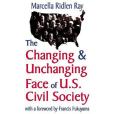《Changing & Unchanging Face of Us Civil Society》是一本圖書,作者是Ray
基本介紹
- 外文名:Changing & Unchanging Face of Us Civil Society
- 作者:Ray
- 出版時間:2002年8月
- 頁數:269 頁
- ISBN:9780765801395
- 定價:48.53 美元
內容簡介
The formation, maintenance, and well being of American civil society is a topic of intense debate in the social sciences. Until now, this debate has lacked rigor, with the term "civil society" commonly used interchangeably and imprecisely with other terms such as civic engagement. Today's discourse also lacks methodological discipline and relies too heavily on narrowly selected...(展開全部) The formation, maintenance, and well being of American civil society is a topic of intense debate in the social sciences. Until now, this debate has lacked rigor, with the term "civil society" commonly used interchangeably and imprecisely with other terms such as civic engagement. Today's discourse also lacks methodological discipline and relies too heavily on narrowly selected evidence in support of a particular argument. In this invaluable contribution to the debate, Marcella Ridlen Ray supplies an empirical study based on a theoretical model of democratic civil society, one that posits high levels of communication, diversity, autonomy, mediation, and voluntary association.In Ray's account, the emergent story of U.S. civil society is that of a dynamic institution, not necessarily one that is linear in its progression. It is a tale of flux, resilience, and stability over the long term that is consistent with subtexts on political equilibrium she notes in the work of early political analysts such as Aristotle, Machiavelli, Locke, Burke, and, later, Tocqueville. Ray dispels the widely accepted myth that Americans are increasingly apathetic and withdrawn from common interests. The evidence reveals a persistence of long-standing public spiritedness, despite the fact that individuals use wider discretion in deciding if and how to attach to community and despite a historical lack of enthusiasm for performing civic duties in lieu of more pleasurable leisure activity. This public-spiritedness continues to reflect embedded religious-cultural values that disproportionately

